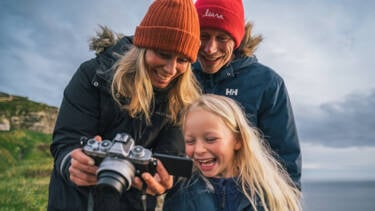What happens when your collaborator is not another photographer, but your family — and your family includes a dolphin?
We’re out in the beautiful nature around Lahinch, on the west coast of Ireland, with the Nikon Z fc mirrorless camera and wild-ocean photographer George Karbus. As well as an extraordinary photographer, George is an accomplished surfer and free diver who has been documenting ocean life around the world for 17 years.
George took a break from professional ocean photography to put the Nikon Z fc through its paces on a candid family shoot. George’s family includes wife Kate, son Joshua, daughter Natalie, Sky — their golden retriever — and a dolphin named Malinka!
Shoot like a pro
Collaboration is about working together, and you can’t work with your environment or your subjects if your kit is always getting in the way. The Nikon Z fc’s light body boasts physical dials that let you easily control shutter speed and aperture, which is ideal if you’re shooting in Manual mode. George also likes to set his Z fc to Auto ISO. With this setup, you never have to worry about the exposure of your shots. You simply dial in the shutter speed and aperture, and the camera does the rest for you.
George also loves how perfectly he can frame through the camera’s LCD monitor. It’s the first vari-angle monitor to be featured on a Nikon Z camera. You’ll be able to frame your shots from any angle you choose, without having to think about how to get into the perfect position.
George Karbus

Putting the Nikon Z fc to the test
George's whole family gets involved
Shoot fast, find the image later
Whether it’s Malinka the dolphin surfing the waves around Lahinch, Natalie on a horse, or Joshua on a surfboard or skateboard, they love to move through the beautiful land close to their Irish home.
The Z fc’s high frame rates in burst mode and Auto ISO lets George make the most of shooting family action.
It’s important to capture as many images as you can — to maximise your chance that one of them shows body language that really brings the activity to life. As George says, with digital photography it costs nothing to take a picture. Keep your finger on the shutter release, and find the standout image later on. You can crop the surroundings to create the framing you want, but for George action is all about how the subject’s movement brings you into the joy of what they’re doing.
With the Z fc shooting at 11 fps, George gets plenty of images in the bag. In daylight, you can set a high shutter speed and a low f/number, which lets you freeze the action in razor-sharp detail.
Be in the moment
It’s all too easy to go out with a pre-determined plan for the image you’re going to capture. You know your subject—especially when that subject is your own family. If you’re shooting at home, you may even know your surroundings. Everything’s just right for getting that killer shot.
But here’s the thing: when you’re so focused on determining the shot before you begin, you can miss the little moments that really make your candid shots come to life. To really work with your family and their surroundings, George recommends simply trying to be with them, getting used to responding to what’s happening as it happens. In other words: collaborate with them.
When you’re so present, when you click with nature, it’s a magic bullet for any photograph
George takes his images in the nature he loves, and he shoots his family in those surroundings. Your family surroundings may be completely different! But at home, in the garden or your local park, you can still practise shooting responsively.
A great tip is to assign a favourite function to the Nikon Z fc’s Fn button. Simply select Controls from the camera’s Custom Setting menu, choose the Fn button, and assign the function you want to use.
Pick the right lens for the job
Collaboration is a two-way street. If you want to make it easy for your family to work with you, you’ll need to be prepared and that means selecting the right lens for the environment you’ll be shooting in.
When shooting Natalie in bluebell woods, George uses the fast NIKKOR Z 28mm f/2.8 SE prime lens to get lovely shallow depth of field with plenty of bokeh. Moving to the bay to get shots of Kate and the dolphin, George changes to use the NIKKOR Z DX 50-250mm f/4.5-6.3 VR zoom lens, which is ideal for anything from portraiture to capturing sharp shots of subjects that are further away.
Use aperture to control depth of field
Shooting multiple family members at the same time can be challenging, especially when one of them is a dolphin! With a candid shot, you can’t be sure that your subjects will all be in the same area of the frame, or on the same plane of focus.
By shooting at a mid-aperture number (George uses f/6.3 in the dolphin shoot), you’ll get a fairly broad depth of field, allowing multiple subjects to stay in sharp focus even when one is several metres behind the other. The lower your f/number, the smaller the depth of field and the greater background blur you can achieve. The higher the number, the bigger the depth of field.
Finally, if you’re photographing subjects in the water on a bright day, it’s also a good idea to use a polarising filter. The polariser will limit reflections, which allows you to capture more detail on your subject.
Explore the Nikon Z fc
Urban street photography with the mirrorless Nikon Z fc

Capture memories





